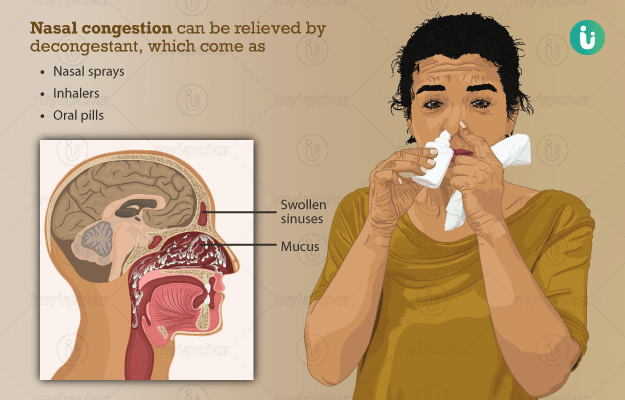What is nasal congestion?
Nasal congestion or nose block is defined as a blockage of the nose due to a swelling in the inner lining of your nose. It is one of the most commonly seen symptoms with a cold. This condition is generally a minor ailment and resolves within a short time period even without medication. It can affect people of all age groups and is particularly common in children. Nasal block is often associated with other disease conditions like allergies or a cold.
What are its main signs and symptoms?
You may experience the following symptoms along with a nasal congestion:
- Breathing difficulty
- Stuffy feeling in nose
- Runny nose and eyes
- Reduced sense of smell and taste
- Disturbed sleep
Rarely, you may experience symptoms like:
- Nose pain and bleeding
- Mucus containing blood
- Formation of a hard crust inside the nose
- Excessive salivation
- Wheezing
- Headache
- Difficulty in swallowing
These rare symptoms are associated with other causes like sinusitis and asthma.
What are the main causes?
You may feel a nasal block due to swelling of the blood vessels inside the nose, tissue swelling and increased secretion of mucus in the nostrils. Conditions that can irritate the inner lining of your nose and cause swelling are:
- Allergic rhinitis
- Sinusitis
- Cold
- Nasal polyps
- Foreign body
- Otitis media (ear infection)
- Asthma
How is it diagnosed and treated?
Your doctor will ask you some questions regarding history of any disease conditions recently like respiratory tract infections or allergies. Your doctor will also examine your nose to look for causes of blockage like polyps.
Treatment includes decongestants which can be taken orally or used topically as sprays or nasal drops. Along with decongestants, other medications are given by your doctor based on the cause of the nasal block.
In case of nasal polyps, drugs are usually given to reduce the size of this outgrowth. If not found to be effective, surgery is recommended.

 Doctors for Blocked Nose (Nasal Congestion)
Doctors for Blocked Nose (Nasal Congestion)  OTC Medicines for Blocked Nose (Nasal Congestion)
OTC Medicines for Blocked Nose (Nasal Congestion)
 Blocked Nose (Nasal Congestion) articles
Blocked Nose (Nasal Congestion) articles

 Home Remedies for Blocked Nose (Nasal Congestion)
Home Remedies for Blocked Nose (Nasal Congestion)







 Editorial Team
Editorial Team


 Dr. Laxmidutta Shukla
Dr. Laxmidutta Shukla











